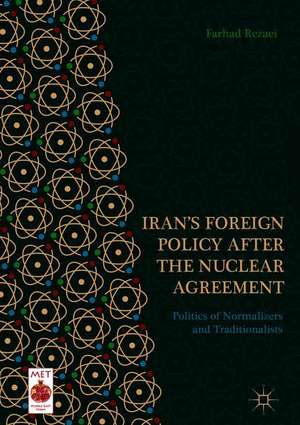Iran’s Foreign Policy After the Nuclear Agreement: Politics of Normalizers and Traditionalists: Middle East Today
Autor Farhad Rezaeien Limba Engleză Hardback – 4 iun 2018
| Toate formatele și edițiile | Preț | Express |
|---|---|---|
| Paperback (1) | 580.49 lei 6-8 săpt. | |
| Springer International Publishing – 24 ian 2019 | 580.49 lei 6-8 săpt. | |
| Hardback (1) | 728.60 lei 6-8 săpt. | |
| Springer International Publishing – 4 iun 2018 | 728.60 lei 6-8 săpt. |
Din seria Middle East Today
-
 Preț: 306.57 lei
Preț: 306.57 lei - 8%
 Preț: 459.53 lei
Preț: 459.53 lei - 18%
 Preț: 687.44 lei
Preț: 687.44 lei - 18%
 Preț: 896.39 lei
Preț: 896.39 lei - 15%
 Preț: 696.68 lei
Preț: 696.68 lei - 18%
 Preț: 1004.00 lei
Preț: 1004.00 lei - 18%
 Preț: 898.26 lei
Preț: 898.26 lei - 15%
 Preț: 471.69 lei
Preț: 471.69 lei -
 Preț: 389.70 lei
Preț: 389.70 lei -
 Preț: 390.08 lei
Preț: 390.08 lei - 15%
 Preț: 497.77 lei
Preț: 497.77 lei -
 Preț: 391.61 lei
Preț: 391.61 lei - 15%
 Preț: 659.70 lei
Preț: 659.70 lei - 18%
 Preț: 731.41 lei
Preț: 731.41 lei -
 Preț: 387.75 lei
Preț: 387.75 lei - 18%
 Preț: 726.37 lei
Preț: 726.37 lei - 15%
 Preț: 643.34 lei
Preț: 643.34 lei - 15%
 Preț: 696.50 lei
Preț: 696.50 lei -
 Preț: 389.70 lei
Preț: 389.70 lei - 15%
 Preț: 586.55 lei
Preț: 586.55 lei -
 Preț: 384.86 lei
Preț: 384.86 lei -
 Preț: 389.70 lei
Preț: 389.70 lei -
 Preț: 383.93 lei
Preț: 383.93 lei -
 Preț: 388.72 lei
Preț: 388.72 lei -
 Preț: 390.63 lei
Preț: 390.63 lei - 15%
 Preț: 642.83 lei
Preț: 642.83 lei -
 Preț: 387.75 lei
Preț: 387.75 lei -
 Preț: 388.72 lei
Preț: 388.72 lei -
 Preț: 418.67 lei
Preț: 418.67 lei - 15%
 Preț: 642.51 lei
Preț: 642.51 lei - 15%
 Preț: 643.34 lei
Preț: 643.34 lei - 15%
 Preț: 584.92 lei
Preț: 584.92 lei -
 Preț: 425.80 lei
Preț: 425.80 lei -
 Preț: 386.81 lei
Preț: 386.81 lei
Preț: 728.60 lei
Preț vechi: 888.53 lei
-18% Nou
Puncte Express: 1093
Preț estimativ în valută:
139.43€ • 151.41$ • 117.12£
139.43€ • 151.41$ • 117.12£
Carte tipărită la comandă
Livrare economică 22 aprilie-06 mai
Preluare comenzi: 021 569.72.76
Specificații
ISBN-13: 9783319767888
ISBN-10: 3319767887
Pagini: 294
Ilustrații: XI, 255 p.
Dimensiuni: 148 x 210 x 22 mm
Greutate: 0.47 kg
Ediția:1st ed. 2019
Editura: Springer International Publishing
Colecția Palgrave Macmillan
Seria Middle East Today
Locul publicării:Cham, Switzerland
ISBN-10: 3319767887
Pagini: 294
Ilustrații: XI, 255 p.
Dimensiuni: 148 x 210 x 22 mm
Greutate: 0.47 kg
Ediția:1st ed. 2019
Editura: Springer International Publishing
Colecția Palgrave Macmillan
Seria Middle East Today
Locul publicării:Cham, Switzerland
Cuprins
1. The Negotiated Political Order and the Making of Iran’s Foreign Policy.- 2. Iran and the United States: The Rise and Fall of the Brief Détente.- 3. Iran and Russia: Completing the Pivot to the East?.- 4. Iran and the European Union: Challenges and Opportunities.- 5. Iran and Iraq: The Lebanonization Project in the Balance.- 6. Iran and Syria: Leveraging the Victory?.- 7. Iran and Saudi Arabia: The Struggle for Regional Hegemony and Islamic Primacy.- 8. Iran and Turkey: Frenemies for Ever?.- 9. Iran and Israel: Taking on the "Zionist Enemy".- 10. Conclusions.
Notă biografică
Farhad Rezaei is Senior Policy Analyst at the Center for Iranian Studies (IRAM), Ankara, Turkey.
Textul de pe ultima copertă
The book offers the first systematic account of Iran’s foreign policy following the nuclear agreement (JCPOA) of July 14, 2015. The author evaluates in what ways the JCPOA, in conjunction with the dramatic changes taking shape in the international order, have affected Iran’s foreign policy. Known as Normalizers, the moderate leadership under President Hassan Rouhani had planned to normalize Iran’s foreign relations by curtailing terrorism and reintegrate Iran into the community of nations. Their hardline opponents, the Principalists, rejected the JCPOA as a tool of subjection to the West and insisted on exporting the Islamist revolution, a source of much destabilization and terror in the region and beyond. The project also analyzes the struggle between Normalizers and their hardline opponents with regards to global and regional issues and Iran’s foreign policy towards global powers including the U.S., Russia, EU, and regional countries including Iraq, Syria, Israel, Saudi Arabia and Turkey.
Farhad Rezaei is Senior Policy Analyst at the Center for Iranian Studies (IRAM), Ankara, Turkey.
Caracteristici
Analyzes the U.S. foreign policy toward Iran and the Middle East Explains the Islamic Republic’s unique political system and the Joint Comprehensive Plan of Action (JCPOA) Highlights the implementation of the JCPOA, limited terror and regional military involvement, and reforming Iran's economy
